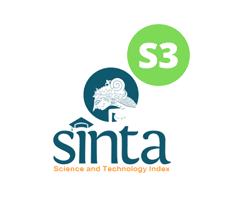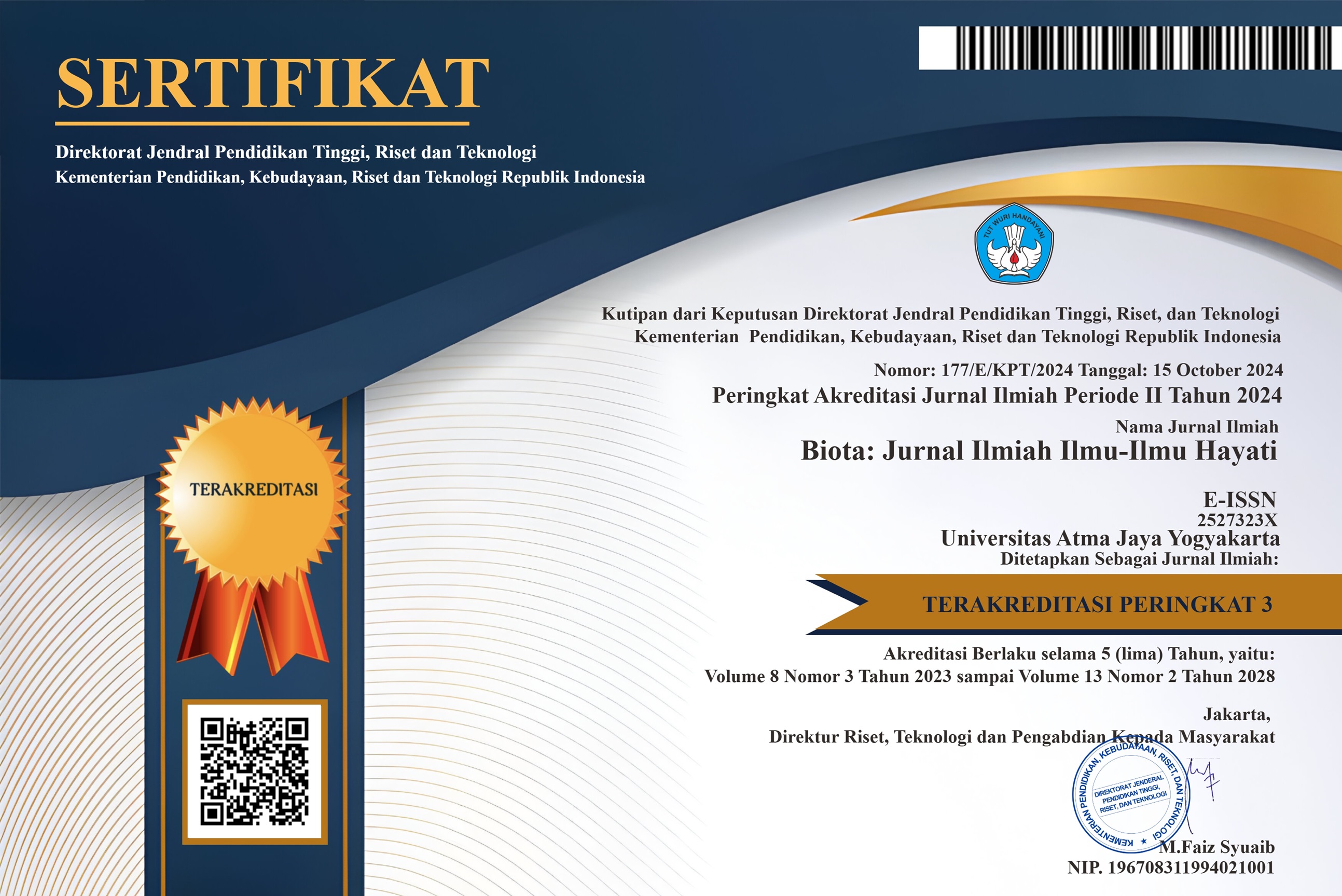Variasi Konsentrasi Plant Growth Promoting Rhizobacteria (PGPR) Rendaman Akar Bambu Menghambat Pertumbuhan Jamur Fusarium oxysporum Secara In Vitro
DOI:
https://doi.org/10.24002/biota.v8i2.6075Keywords:
akar bambu, biokontrol, Fusarium oxysporum, growth promoting rhizobacteria, uji antagonisAbstract
Salah satu agen hayati yang berpotensi sebagai biopestisida adalah plant growth promoting rhizobacteria (PGPR). PGPR memiliki kemampuan dalam menekan pertumbuhan jamur Fusarium oxysporum melalui mekanisme secara langsung dan secara tidak langsung. PGPR diketahui ada pada akar bambu yang memiliki kemampuan meningkatkan pertumbuhan tanaman bambu dan menekan aktivitas fitopatogen. Penelitian ini bertujuan untuk mengetahui daya hambat serta konsentrasi optimum dari PGPR rendaman akar bambu dalam menghambat pertumbuhan jamur Fusarium oxysporum. Metode pengujian digunakan adalah metode uji antagonis pada media PDA, dan media campuran PDA dan NA. Variasi konsentrasi PGPR rendaman akar bambu yang digunakan adalah 2,5, 5, 7,5 dan 10%. Data yang diperoleh dalam penelitian ini dianalisis secara deskriptif dan statistik. Analisis statistik menggunakan uji One Way Anova dan dilanjutkan dengan uji Tukey HSD pada taraf signifikansi 0,05. Hasil penelitian ini menunjukkan bahwa ada perbedaan daya hambat PGPR rendaman akar bambu berbagai konsentrasi terhadap pertumbuhan jamur Fusarium oxysporum pada media uji PDA dan media campuran. Konsentrasi PGPR rendaman akar bambu yang paling efektif dalam menghambat pertumbuhan jamur Fusarium oxysporum adalah 10%.
References
Anand, A., Chinchilla, D., Tan, C., Mène-Saffrané, L., L’Haridon, F., Weisskopf, L. (2020). Contribution of Hydrogen Cyanide to the Antagonistic Activity of Pseudomonas Strains Against Phytophthora infestans. Microorganisms 8: 1144.
Beneduzi, A., Ambrosini, A., Passaglia, L.M. (2012). Plant Growth-Promoting Rhizobacteria (PGPR): Their Potential as Antagonists and Biocontrol Agents. Genet Mol Biol 35: 1044-1051.
Boukerma, L., Benchabane, M., Charif, A. and Khelifi, L. (2017). Activity of Plant Growth Promoting Rhizobacteria (PGPRs) in the Biocontrol of Tomato Fusarium Wilt. Plant Protect. Sci 53(2): 78–84.
Diliarosta, S., Rahmat, S., Dwi, S.D., Blomechy, O.D. (2020). Innovation of Organic Vegetable Business Management Through Website Based “SKUPA” Model in Payobasung, Payukumbuh Indonesia. Pelita Eksata 3(2): 181-186.
Hua, G.K.H., Wang, L., Chen, J., & Ji, P. (2020). Biological Control of Fusarium Wilt on Watermelon by fluorescent Pseudomonads. Biocontrol Sci. Technol 30(3): 212-227.
Kenawy, A., Dailin, D.J., Abo-Zaid, G.A., Malek, R.A., Ambehabati, K.K., Khairun, K.H.N., Zakaria, H.N., Sayyed, R.Z., and Enshasy, H.A.E. (2019). Plant Growth Promoting Rhizobacteria for Sustainable Stress Management: Biosynthesis of Antibiotics by PGPR and Their Roles in Biocontrol of Plant Diseases. Springer. India.
Nasiroh, U., G. Isnawati dan Trimulyono. (2015). Aktivitas antifungi Serratia marcescens terhadap Alternaria porri penyebab penyakit bercak ungu secara in vitro. Jurnal Biologi 4(1): 13-18.
Nazir, U., M. Y. Zargar., Z. A. Baba., S. A. Mir, F. A. Mohiddin and Bhat, N. A. (2020). Biocontrol Potential of Plant Growth Promoting Rhizobacterium (PGPR)-Pseudomonas against Plant Pathogenic Fungi. Int.J.Curr.Microbiol.App.Sci 9(2): 2516-2520.
Okunowo, W.O., O.Oyedeji, L.O. Afolabi, E. Matanmi. (2013). Essential Oli of Grape Fruit (Citrus paradisi) Peels and Its Antimicrobial Activities. American Journal of Plant Sciences 4: 1-9.
Paramanandham, P., Jobina, R., Subhaswaraj, P. & Siddhardha, B. (2017). Biocontrol Potential Against Fusarium oxysporum f. sp. lycopersici and Alternaria solani and Tomato Plant Growth Due to Plant Growth–Promoting Rhizobacteria. International Journal of Vegetable Science pp. 1-10.
Pitasari, A., & Ali, M. (2018). Isolasi dan Uji Antagonis Bakteri Endofit dari Tanaman Bawang Merah (Alllium ascalonicum L.) terhadap Jamur Alternaria porri Ellis Cif. JOM Faperta 5(1):1-12.
Pratiwi, F., Marlina & Mariana. (2017). Pengaruh Pemberian Plant Growth Promoting Rhizobakteria (PGPR) dari Akar Bambu terhadap Pertumbuhan dan Hasil Bawang Merah (Allium ascalonicum L.). Jurnal Agrotropika Hayati 4(2): 77 – 82.
Ramadhani, M.A. & Sulistyan, N. (2018). Uji Aktivitas Isolat Actinomycetes (Kode Gst, Kp, Kp11, Kp16, T24, dan T37) terhadap Staphylococcus Aureus ATCC 25923 dan Escherichia coli ATCC 25922. Indonesian Journal of Pharmacy and Natural Product 1(2): 20-37.
Rathore, R., Vakharia, D. N., & Dheeraj S. R. (2020). In Vitro Screening of Different Pseudomonas fluorescens Isolates to Study Lytic Enzyme Production and Growth Inhibition During Antagonism of Fusarium oxysporum f. sp. cumini, Wilt Causing Pathogen of Cumin. Egyptian Journal of Biological Pest Control 30(57): 1-8.
Rehman, F., Kalsoom, M., Adnan, M., Toor, M.D., Zulfiqar, A. (2020). Plant Growth Promoting Rhizobacteria and their Mechanisms Involved in Agricultural Crop Production: A Review. SunText Rev Biotechnol 1(2): 110.
Risdianto, H., Setiadi, T., Suhardi, S.H., Niloperbowo, W. (2007). Pemilihan Spesies Jamur dan Media Imobilisasi Untuk Produksi Ezim Ligninolitik. Prosiding Seminar Nasional Rekayasa Kimia dan Proses. Bandung.
Rohayatun, I., Rahmawati, dan Mukarlina. (2017). Uji Antagonis Isolat Jamur Rizosfer Lokal terhadap Phytophthora sp. Im5 dari Pangkal Batang Tanaman Jeruk Siam (Citrus nobilis var microcarpa). Protobiont 6(3): 130-135.
Sangoyomi, T.E. (2004). Post-harvest Fungal Deterioration of Yam (Dioscorea rotundata Poir) and its Control [Thesis]. International Institute of Tropical Agriculture.
Suryanto, D., Irawati, N., Munir, E. (2011). Isolation and Characterization of Chitinolytic Bacteria and Their Potential to Inhibit Plant Pathogenic Fungi. Microbiologi Indonesia 5(3): 144–148.
Syed Nabi, R., Begum., Shahzad, R., Tayade, R., Shahid, M., Hussain, A., Ali, M. W., & Yun, B.-W. (2020). Evaluation Potential of PGPR to Protect Tomato against Fusarium wilt and Promote Plant Growth. PeerJ, 9.
Tariq, M., Noman, M., Ahmed, T., Hameed, A., Manzoor, N. (2017). Antagonistic Features Displayed by Plant Growth Promoting Rhizobacteria (PGPR): A Review. J Plant Sci Phytopathol 1: 038-043.
Vignesh, K., Meenatchi, S. & Tamilselvan, B. (2021). In-Vitro Efficacy of PGPR Bacillus Subtilis against Fusarium Wilt in Tomato. AgriCos e-Newsletter 27(2): 88-91.
Viveros, O.M., Jorquera, M.A., Crowley, D.E, Gajardo, G., Mora, M.L. (2010). Mechanisms and Practical Considerations Involved in Plant Growth Promotion by Rhizobacteria. J Soil Sci Plant Nutr 10: 293-319.
Yanti, Y., Hamid, H., Reflin., Warnita., Habazar, T. (2020). The Ability of Indigenous Bacillus spp. Consortia to Control the Anthracnose Disease (Colletrotricum capsici) and Increase the Growth of Chili Plants. Biodiversitas 21(1): 179-186.
Downloads
Published
How to Cite
Issue
Section
License
Copyright (c) 2023 I Kadek Sandiase, Ni Luh Putu Manik Widiyanti, I Wayan Sukra Warpala

This work is licensed under a Creative Commons Attribution-NonCommercial 4.0 International License.
Authors who publish with Biota : Jurnal Ilmiah Ilmu-Ilmu Hayati agree to the following terms:
- Authors retain copyright and grant the Biota : Jurnal Ilmiah Ilmu-Ilmu Hayati right of first publication. Licensed under a Creative Commons Attribution-NonCommercial 4.0 International License that allows others to share the work with an acknowledgment of the work's authorship and initial publication in this journal.
- Authors are able to enter into separate, additional contractual arrangements for the non-exclusive distribution of the journal's published version of the work (e.g., post it to an institutional repository or publish it in a book), with an acknowledgment of its initial publication in Biota : Jurnal Ilmiah Ilmu-Ilmu Hayati, and as long as Author is not used for commercial purposes.













